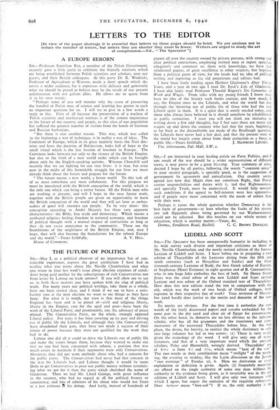LIDDELL AND SCOTT SIR, —The Spectator has been unexpectedly humanist in
including in its wide survey such diverse and important criticisms as those of Mr. Neville Chamberlain and the newly revised edition of the famous Lexicon of Liddell and Scott. I have before me in preparing a new edition of Thucydides all the Lexicons dating from the fifth and tenth centuries (such as Hesychius and Suidas) and the three sixteenth-century Lexicons of Bude, the first Greek scholar of Europe, of Stephanus (Henri Estienne) in eight quartos and of R. Constantinus, who in one huge folio embodies the best of both. Sir Henry Stuart Jones was the chief editor of the new Liddell and Scott revised Lexicon and was editor of the Oxford standard text of Thucydides. How does this new edition stand the test in comparison with the old, which was the work of two heads of Oxford colleges, both supreme in their respective line of work? Your reviewer of Novem- ber 22nd hardly does justice to the merits and demerits of the new work.
Its merits are obvious. For the first time it embodies the new words of the lately discovered papyri and ostraka embedded for the most part in the dry sand and clear air of Egypt for preservation. On the other hand, its demerits are no less obvious to the toilsome scholar, who has all the grammars and the translators and com- mentators of the recovered Thucydides before him. In the first place, the desire, for brevity, to restrict the whole dictionary to only two large volumes has led to two errors: (r) There is very rarely given the etymology of the word. I will give only one of many instances, and that of a very important word which the eminent scholars, Paley and Bloomfield, wrongly derived. Thucydides' use of delbi is from SL and Idol, which means " heat of the sun.' The two words in their combination mean " twilight " of the morn- ing, the evening or midday, like the Latin diluculum or the Jewish " two evenings " of Exodus xii, 6. Here no derivation or exact explanation or definition is given. Again, (2) frequently meanings are affixed on the single authority of some one man without his authority or the evidence being given, as it invariably was in the old editions of Liddell and Scott. I will give only two instances with which I agree, but regret the omission of the requisite references. Does cipAucep mean " fore-sail"? If so, the only authority is no great Greek scholar, the famous sailor, Smith of Jordanhill, who surveyed the scenes of St. Paul's shipwreck. But the present Italian and French use of this same word, namely, artimone and voile d'artimon makes it mean some sort of aft-sail. Again, to go back to my first instance, does Se/eXeclay mean " take an afternoon meal "? The sole authority is a guess of the great German gram- marian, Buttmann, who is mentioned in the former editions of Liddell and Scott but omitted here.
To return to Thucydides and Sir Henry Stuart Jones, his latest
editor. Let me point out a desperate mistake. IlapeEetptata means the space at either end of the ship which lay outside the reach of the• rowers of the galleys, who occupied the whole of the middle decks. No commentary or version or dictionary from the fifth century has ever disputed this; hence its use in the plural, and the English rendering would be fore-ship and poop or, in nautical language, " fo'c'sle and quarter-deck." The old Liddell and Scott are right. The new Liddell and Scott give it as " oar-box " (which the ancients never had) or " outriggers," which is also against their usage. I would like some further light on this method of annotating old Greek words without authority. A book like this is vital to the education of our coming scholars of Oxford and Cambridge and will be read by the Germans, who are still our masters in Greek.—Yours































 Previous page
Previous page